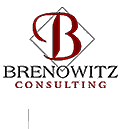


|
Issue # 7 - Winning in Fast Times
TOOLS
for TEAMS Issue # 7 Brenowitz Consulting is pleased to bring you this issue of Tools for Teams, our bi-monthly electronic newsletter. Each issue will explore one of the central themes of today's challenging business environment. We will present our current thinking, relevant readings, book reviews, and other resources--all designed to give you practical tools to improve productivity through teamwork and collaboration Feel free to forward this newsletter to your friends and colleagues. To subscribe, send e-mail newsletter@brenowitzconsulting.com with "subscribe" in the subject line. To unsubscribe, email newsletter@brenowitzconsulting.com with “unsubscribe” in the subject line. You may quote anything herein, with the following attribution: “Reprinted from Tools for Teams, © Brenowitz Consulting (www.brenowitzconsulting.com).” We welcome your comments and suggestions for future topics. Just email us at info@brenowitzconsulting.com.
* * * * * Issue # 7– Winning in Fast Times
In today's warp-speed world, an approach that accelerates strategic thinking and action is essential. To win, your team must decide what you want your tomorrow to be, and then resolve to make it happen faster than the rate of change in your competitive environment. This is, in the words of John Warden III and Leland Russell, Winning in Fast Time (GeoGroup Press, 2001). Their Prometheus Process is a systematic and proven method for designing winning strategies. It's simple enough for everyone to grasp, yet sophisticated enough to use in planning, executing, and completing projects of any scope and complexity. According to Greek mythology, Prometheus gave both forethought and fire to mankind. Warden and Russell believe that today forethought and fire (passion) are the fuel for high-performing teams. Prometheus is both a mindset and a method for rapid, decisive, strategic action. Its essence is simple: think strategically, focus sharply, and move quickly. The Prometheus process was originally developed for the Desert Storm Air Campaign. If you're like me, it will take some effort to read beyond all of the military metaphors and examples. It's worth the trouble, though, as the process has been well adapted to address the issues and concerns of teams and organizations in private industry. The Prometheus process is built around four fundamental imperatives: The Design the Future imperative is about painting a clear and compelling picture of your team's destination, measuring strategic success, and defining the rules of conduct for the organization. After considering the business, economic, and political context in which your team operates, you can design a future picture -- a clear and compelling description of what you want reality to be for your team at some point in the future. The Prometheus process then has you work back from the future -- not forward from the present. The Target for Success imperative is about selecting the right targets for action and then defining the desired effects. Warden and Russell suggest that you create a system map of your organization by asking, "What components -- people, process, and physical things -- make up your system." Then ask "Which actions will result in the greatest probability of having a system effect?" These are your targets. They suggest a parallel approach where you tackle several targets at once so that the overall impact of your efforts will be sufficient to move the team closer to the future picture. The Campaign to Win imperative is about aggressively executing your systems strategy and monitoring your progress. This is the phase of Prometheus in which you create parallel projects and organize your team for success. The process stresses action and does not confuse planning to act with action. This is the place where strategy and planning meet tactical actions. The Finish with Finesse imperative is about planning for product or process "end of life." To remain a perennial winner, you must plan the endgame in advance. This means that you must define the criteria for the end of our project or program, thereby ensuring that you maximize and retain your financial and technical gains, that you will be able to quickly recognize when something is not working, and that you end in a manner that leaves you in the strongest possible position to launch your next effort. Warden and Russell give some cardinal rules to follow while going through the Prometheus process. My favorites are: think like an architect and not like a bricklayer, execute "good enough" plans, and focus on the future. These three will help you to follow the Prometheus process and bring strategic thinking, sharp focus, and quick action to your team. * * * * * * * * * * Additional Resources GEO Group Strategic Services, Inc. offers a unique blend of traditional and on-line tools based on the concepts discussed in Winning in Fast Time to create strategic action with virtual or co-located teams. Contact them at 949-250-9060 or www.geogroup.net. The Centre for Strategic Management offers Executive Briefing Booklets and PDF articles that you can download from www.csmintl.com. Chapters
6 & 7 in Execution: The Discipline of Getting Things Done
by Bossidy & Charan (Crown Publications, 2002) have a wealth
of information on getting the right people to execute your strategy
and on connecting your strategy with your operating plan. * * * * * * * * * What's New at Brenowitz Consulting In writing:
|
||||||||
|
||||||||